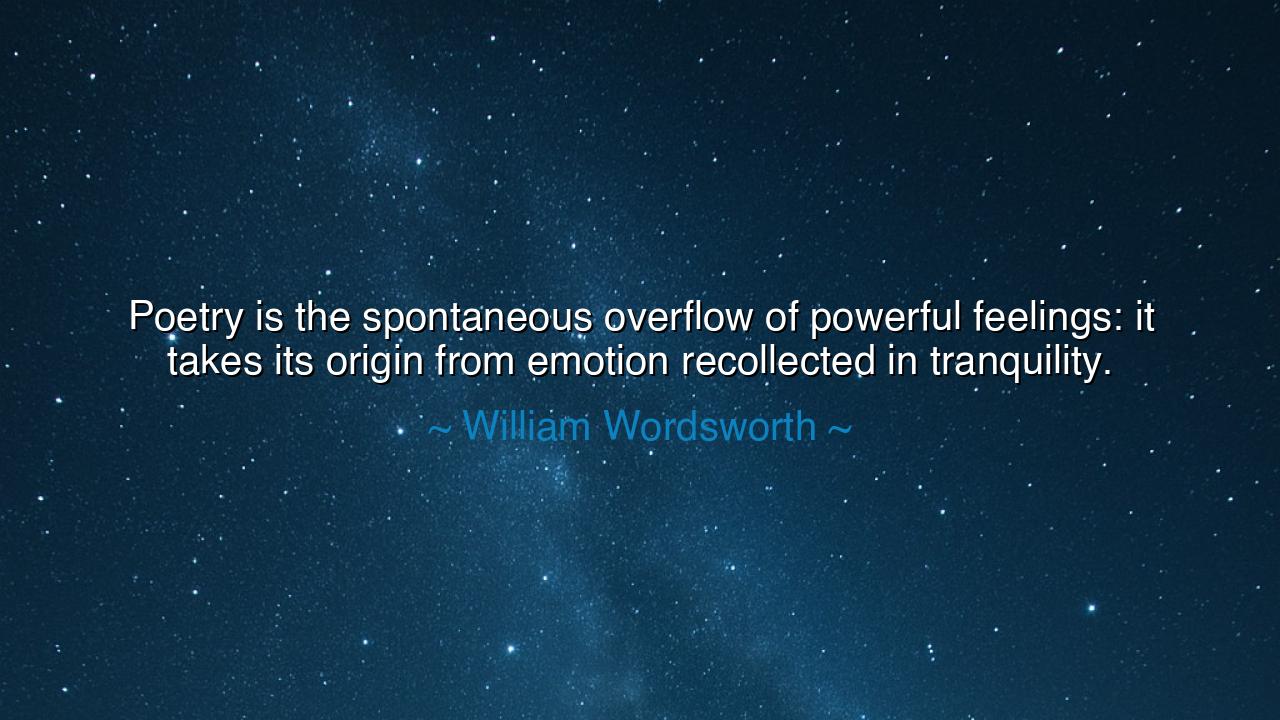
Poetry is the spontaneous overflow of powerful feelings: it
Poetry is the spontaneous overflow of powerful feelings: it takes its origin from emotion recollected in tranquility.






William Wordsworth, the great voice of Romantic poetry, gave to us one of the most enduring definitions of art itself: “Poetry is the spontaneous overflow of powerful feelings: it takes its origin from emotion recollected in tranquility.” With these words, he lifted the veil on the mystery of creation, revealing that poetry does not arise from cold logic or deliberate artifice, but from the deep reservoir of human feeling. Yet it is not merely the raw flood of emotion that makes poetry—it is emotion transformed by reflection, shaped by memory, and recollected in the calm light of tranquility.
The ancients too knew this truth, though they spoke it in different tongues. The Greek tragedians drew upon the overflow of powerful feelings—fear, pity, grief, love—to stir the hearts of their audiences. But those feelings were not poured forth blindly; they were ordered into dramas, shaped by form and structure, born from reflection on the nature of life and fate. Wordsworth’s vision stands in this same lineage, reminding us that art is both storm and stillness, both passion and contemplation.
History offers vivid proof of his insight. Consider Anne Frank, a young girl hidden away in an attic, who poured her thoughts into a diary during the horrors of war. Her writing did not spring from detached analysis but from the overflow of powerful feelings—fear, longing, hope. Yet her words were composed with reflection, with a stillness of spirit that gave form to her emotions. It is this balance—raw passion recollected in calm—that has made her diary one of the most moving and enduring testimonies of human resilience.
Wordsworth himself lived what he spoke. Wandering through the English countryside, he was stirred by beauty, by solitude, by memory. Yet he did not write immediately in the frenzy of experience. He waited until tranquility returned, until he could look back upon the moment with clarity. Only then did he give shape to his poems, so that they carried not just fleeting emotion, but distilled truth. This is why his verses, such as Lines Composed a Few Miles Above Tintern Abbey, resonate with such deep serenity—they are the song of passion transformed into wisdom.
There is also a heroic discipline in this teaching. Many believe that to be an artist is simply to feel deeply. But Wordsworth tells us this is not enough. To feel is the beginning; to transform feeling into enduring expression is the task. A storm may be powerful, but without form, it only destroys. The poet must take the storm of the heart and give it shape, so that its power is not lost, but carried forward to others. The union of emotion and tranquility is what makes poetry eternal.
So what lesson shall we, children of tomorrow, carry from Wordsworth’s wisdom? It is this: do not despise your emotions, for they are the wellspring of creativity. Let them overflow, let them move you. But also do not be enslaved by them; wait, reflect, recollect. In stillness, give your feelings form, and in form, they will gain strength to endure. Whether in poetry, in art, or in the poetry of daily life, learn the balance of passion and calm.
Practical wisdom follows. When you are overwhelmed, do not rush to speak or to act. Sit in tranquility, and let your heart’s flood become clear. When you wish to create, do not chase inspiration desperately—let your emotions settle, then return to them in reflection. In daily life, practice patience: wait until words will not wound but heal, until feelings can be given voice that others may share them. In this way, you will live as both storm and still water, passionate yet wise.
Thus Wordsworth’s teaching endures: poetry is the spontaneous overflow of powerful feelings, born from emotion recollected in tranquility. This is not only a law of art but a law of life. For only when we unite passion with reflection, heart with stillness, can our words and deeds become lasting, luminous, and worthy of remembrance.






YNTran pham yen nhi
Wordsworth’s quote seems to imply that the best poetry comes from intense emotional experiences that are later reflected upon in a calm state. But what about poets who write from a place of inner turmoil or ongoing struggle? Is their work still valid if it doesn’t follow this 'tranquil recollection' model? Maybe there’s room for both approaches—what do you think?
ATNguyen Anh Thu
I always find myself questioning whether 'spontaneous overflow' in poetry can still happen today with all the distractions and noise around us. Can we, in a modern context, still capture pure emotion in such a free and unfiltered way? Or do we need to reflect more consciously on our feelings in order to express them? It seems like poetry’s relationship with emotions has changed, but I’m not sure how much.
TDPham Trung Duoc
This quote makes me think about how we, as readers, experience poetry. Does the 'tranquility' in 'emotion recollected in tranquility' imply that the poet must be in a peaceful state to create something meaningful? Or could it suggest that only after time has passed and emotions have settled can one truly express their feelings effectively? I’d love to know your thoughts on how time affects the process of writing poetry.
ADAnh Dinh
I often wonder whether Wordsworth’s idea of poetry as the overflow of powerful emotions is still relevant in today’s world. Can modern poets, who often focus on more abstract or experimental forms, truly tap into these 'spontaneous' feelings, or is it just a matter of style? What do you think—has poetry evolved in the way it captures emotion, or does it still hinge on the emotional depth he describes?